现在完成时中短暂性动词与延续性动词的转换
现在完成时中瞬间动词变延续性动词总结
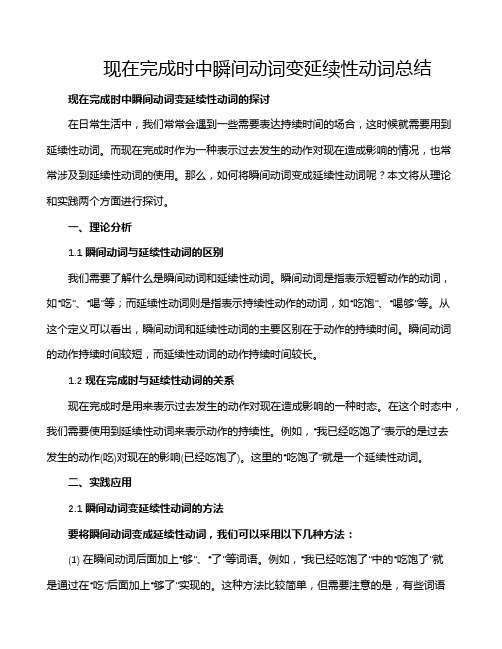
现在完成时中瞬间动词变延续性动词总结现在完成时中瞬间动词变延续性动词的探讨在日常生活中,我们常常会遇到一些需要表达持续时间的场合,这时候就需要用到延续性动词。
而现在完成时作为一种表示过去发生的动作对现在造成影响的情况,也常常涉及到延续性动词的使用。
那么,如何将瞬间动词变成延续性动词呢?本文将从理论和实践两个方面进行探讨。
一、理论分析1.1 瞬间动词与延续性动词的区别我们需要了解什么是瞬间动词和延续性动词。
瞬间动词是指表示短暂动作的动词,如“吃”、“喝”等;而延续性动词则是指表示持续性动作的动词,如“吃饱”、“喝够”等。
从这个定义可以看出,瞬间动词和延续性动词的主要区别在于动作的持续时间。
瞬间动词的动作持续时间较短,而延续性动词的动作持续时间较长。
1.2 现在完成时与延续性动词的关系现在完成时是用来表示过去发生的动作对现在造成影响的一种时态。
在这个时态中,我们需要使用到延续性动词来表示动作的持续性。
例如,“我已经吃饱了”表示的是过去发生的动作(吃)对现在的影响(已经吃饱了)。
这里的“吃饱了”就是一个延续性动词。
二、实践应用2.1 瞬间动词变延续性动词的方法要将瞬间动词变成延续性动词,我们可以采用以下几种方法:(1) 在瞬间动词后面加上“够”、“了”等词语。
例如,“我已经吃饱了”中的“吃饱了”就是通过在“吃”后面加上“够了”实现的。
这种方法比较简单,但需要注意的是,有些词语并不能直接与瞬间动词搭配,如“看”、“听”等。
这时,我们可以使用“看完”、“听完”等词语来替代。
(2) 将瞬间动词变为动名词。
例如,“我吃完饭就去睡觉”可以改为“我吃完饭后就去睡觉”。
这里,“吃饭”变成了动名词“吃饭”,实现了从瞬间动词到延续性动词的转变。
这种方法适用于大多数情况,但需要注意的是,动名词本身并不具备时态的意义,因此在使用时需要注意上下文的时态。
2.2 现在完成时变延续性动词的例子下面我们通过几个例子来说明如何将现在完成时变为目标时态。
现在完成时短暂性转换延续性

现在完成时用法短暂性转换延续性1 转换成延续性动词如do keep have wear have a coldstart/begin to do sth. → do sth.borrow → keep lose → not havebuy → have put on → wearcatch/get a cold → have a coldget to know → know2 be +介词begin → be onbe in sw./at school/at home/on the farm3 be +形容词,副词come/go back, return → be back come/go out → be out close → be closed open → be openbecome → beget up → be up die → be deadleave sw. → be away from sw.fall asleep/get tot sleep → be asleepfinish/end → be over marry → be marriedbe here/be there4 join用法join the league/the Party/the army→ be a league/a Party member /a soldier→ be a member of the league/the Party→ be in the league/the Party/the army①arrive at/in sw. get to/reach sw. come/go/move to sw.→be in sw./at school/at home/on the farm/be here/be thereHe got to Beijing five minutes ago.He ________ _________ _________ Beijing for _________ _________.I moved to the USA last year.I ________ ________ __________ the USA since __________ __________.I went home yesterday.I _______ ________ _________ home for _________ __________.They came here last week.They _________ _________ here since _________ __________.②come/go back, return → be back come/go out → be outHe came out two years ago.He _________ __________ _________ for __________ __________.We return to Fuzhou yesterday.We ________ ________ _________ to Fuzhou since __________.③become → beI became a teacher in 2000.I ________ __________ a teacher for _________ _________.The river became dirty last year.The river _________ _________ dirty for _________ __________.④close → be closed open → be openThe shop closed two hours ago.The shop ________ _________ _________ for _________ _________.The door opened at six in the morning.The door ________ ________ ________ for six hours.⑤get up → be up die → be deadleave sw. → be away from sw.fall asleep/get tot sleep → be asleepfinish/end → be over marry → be marriedI got up two hours ago.I ________ ________ ________ since ________ ________.He left Fuzhou just now.He _______ ________ ________ _________ Fuzhou for five minutes.My grandpa died in 2002.My grandpa _______ _______ ________for _______ ________.The meeting finished at six.The meeting ________ ______ ______ for six hours.I got to sleep two hours ago.I ________ _________ _________ since _________ __________.They married in 1990.They ________ _________ __________since _________.⑥start/begin to do sth. → do sth. begin → be onI began to teach at this school in 1995.I ____ ____ at this school since ____.The film began two minutes ago.The film ____ ____ ____ for ____ ____.⑦borrow → keep lose → not have buy → have put on → wear catch/get a cold → have a cold get to know → knowThey borrowed it last week.They _________ _________ it since __________ __________.I bought a pen two hours ago.I _________ _________ a pen for ________ __________.I got to know him last year.I _________ __________ him since __________ __________.I put on my glasses three years ago.I __________ __________ my glasses for _________ _________.⑧have/has gone to → have been inHe has gone to Beijing.He ____ ____ _____ Beijing for two days.⑨join the league/the Party/the army→ be a league/a Party member/a soldier→ be a member of the league/the Party→ be in the league/the Party/the armyHe joined the league in 2002.入团He ________ _________ a _________ _________ for two years.He ________ __________ a __________ ___________ the __________ for two years.He ____________ ___________ ___________ the league for two years.My brother joined the army two years ago.My brother __________ __________ a ___________ for ___________ ___________.My brother ___________ ___________ in ____________ ___________ for two years.。
短暂性动词-延续性动词和现在完成时

短暂性动词-延续性动词和现在完成时短暂性动词,延续性动词和现在完成时延续性动词是指动作发生后还可以延续一段时间或者相当长的一段时间。
如:live, work, study, learn, sleep 等,延续性动词可以和表示一段的时间状语连用。
短暂性动词是指动作一旦发生就立即结束。
它不能和一段时间连用。
这类动词有:go, come, arrive, leave, begin, start, join, marry 等;★在否定句中,短暂性动词可以和表示一段时间的状语连用。
We haven’t hea rd from Jane for a long time.★短暂性动词的肯定式不能与表示一段时间的for 或since 或how long 等状语连用。
★值得注意的是,表示一段时间的状语除了“for+一段时间”外,还有since+n./从句(时间点),since+时间段+ago ,疑问词how long ,in the past+时间段,all these+时间段,from…to (时间点)以及till/until+n./句子等等。
例如:.I have received his letter for three days (×) I have received his letter.(√)How long did she leave .(×) How long has she been away? (√)★★★如果短暂性动词与表示一段时间的时间状语连用,必须将短暂性动词改为延续性动词。
现归纳总结一下由非延续性动词到延续性动词的转换:arrive →be here ★除了用上面的转化形式之外,还可以用其他的表达形式:A. It is 或者 It has been+时间+since……(动词用过去式),B.主语+谓语(过去时)+时间+ago 。
例如:It’s five days since I received his letter.arrive →be herebegin(start)→be ondie →be deadcome back →be backleave →be away (from)fall ill(asleep)→beill( asleep) get up →be up go out →be out finish →be over put on →wear 或be on open →be open close →be closed join →be in/ be a member of go to school →be a student borrow →keep buy/get →have catch(a cold)→ have(a cold) get to know →know begin to study →study come to work →work move to → live in finish/end → be over come to → be in sit down → be seatedHis father died three years ago.看一个句子可以用以下几种说法:他离开上海已经3天了。
把短暂性动词转换为延续性词方法
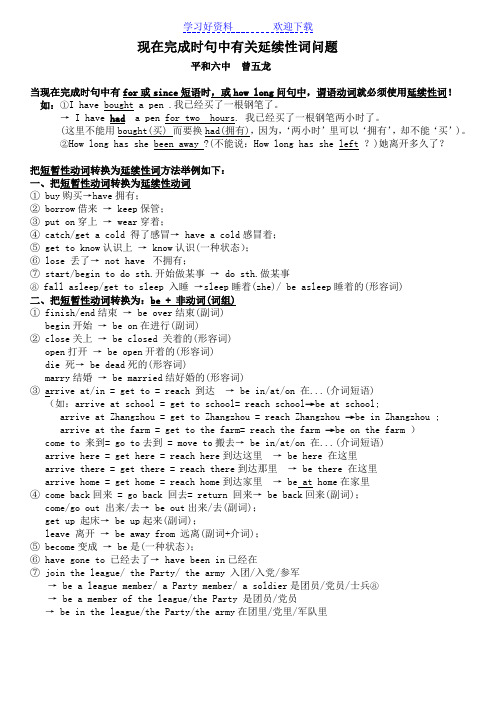
现在完成时句中有关延续性词问题平和六中曾五龙当现在完成时句中有for或since短语时,或how long问句中,谓语动词就必须使用延续性词!如:①I have bought a pen .我已经买了一根钢笔了。
→ I have had a pen for two hours. 我已经买了一根钢笔两小时了。
(这里不能用bought(买) 而要换had(拥有),因为,‘两小时’里可以‘拥有’,却不能‘买’)。
②How long has she been away ?(不能说:How long has she left ?)她离开多久了?把短暂性动词转换为延续性词方法举例如下:一、把短暂性动词转换为延续性动词① buy购买→have拥有;② borrow借来→ keep保管;③ put on穿上→ wear穿着;④ catch/get a cold 得了感冒→ have a cold感冒着;⑤ get to know认识上→ know认识(一种状态);⑥ lose 丢了→ not have不拥有;⑦ start/begin to do sth.开始做某事→ do sth.做某事⑧ fall asleep/get to sleep 入睡→sleep睡着(zhe)/ be asleep睡着的(形容词)二、把短暂性动词转换为:be + 非动词(词组)① finish/end结束→ be over结束(副词)begin开始→ be on在进行(副词)② close关上→ be closed 关着的(形容词)open打开→ be open开着的(形容词)die 死→ be dead死的(形容词)marry结婚→ be married结好婚的(形容词)③ arrive at/in = get to = reach 到达→ be in/at/on 在...(介词短语)(如:arrive at school = get to school= reach school→be at school;arrive at Zhangzhou = get to Zhangzhou = reach Zhangzhou →be in Zhangzhou ;arrive at the farm = get to the farm= reach the farm →be on the farm )come to 来到= go to去到 = move to搬去→ be in/at/on 在...(介词短语)arrive here = get here = reach here到达这里→ be here 在这里arrive there = get there = reach there到达那里→ be there 在这里arrive home = get home = reach home到达家里→ be at home在家里④ come back回来 = go back 回去= return 回来→ be back回来(副词);come/go out 出来/去→ be out出来/去(副词);get up 起床→ be up起来(副词);leave 离开→ be away from 远离(副词+介词);⑤ become变成→ be是(一种状态);⑥ have gone to 已经去了→ have been in已经在⑦ join the league/ the Party/ the army 入团/入党/参军→ be a league member/ a Party member/ a soldier是团员/党员/士兵⑧→ be a member of the league/the Party 是团员/党员→ be in the league/the Party/the army在团里/党里/军队里按要求把短暂性动词转换为延续性词的练习A.1)He got to Beijing five minutes ago.He ________ _________ _________ Beijing for _________ _________.2)I moved to the USA last year.I ________ ________ __________ the USA since __________ __________.3)I went home yesterday.I _______ ________ _________ home for _________ __________.4)They came here last week.They _________ _________ here since _________ __________.B.1)He came out two years ago.He _________ __________ _________ for __________ __________.2)We return to Fuzhou yesterday.We ________ ________ _________ to Fuzhou since __________.C.1)I became a teacher in 2000.I ________ __________ a teacher for _________ _________.2)The river became dirty last year.The river _________ _________ dirty for _________ __________.D.1)The shop closed two hours ago.The shop ________ _________ _________ for _________ _________.2)The door opened at six in the morning.The door ________ ________ ________ for six hours.E.1)I got up two hours ago.I ________ ________ ________ since ________ ________.2)He left Fuzhou just now.He _______ ________ ________ _________ Fuzhou for five minutes.3)My grandpa died in 2002.My grandpa _______ _______ ________for _______ ________.4)The meeting finished at six.The meeting ________ ______ ______ for six hours.5)I got to sleep two hours ago.I ________ _________ _________ since _________ __________.6)They married in 1990.They ________ _________ __________since _________.F.1)I began to teach at this school in 1995.I ____ ____ at this school since ____.2)The film began two minutes ago.The film ____ ____ ____ for ____ ____.G.1)They borrowed it last week.They _________ _________ it since __________ __________.2)I bought a pen two hours ago.I _________ _________ a pen for ________ __________.3)I got to know him last year.I _________ __________ him since __________ __________.4)I put on my glasses three years ago.I __________ __________ my glasses for _________ _________.H.1)He has gone to Beijing.He ____ ____ _____ Beijing for two days.I.1)He joined the league in 2002.He ________ _________ a _________ _________ for two years.He ________ __________ a __________ ___________ the __________ for two years.He ____________ ___________ ___________ the league for two years.2)My brother joined the army two years ago.My brother __________ __________ a ___________ for ___________ ___________.My brother ___________ ___________ in ____________ ___________ for two years.答案按要求把短暂性动词转换为延续性词(当句中有for或since短语时就必须转换为延续性词) A.1)He got to Beijing five minutes ago. 他五分钟前到达北京的。
修改名词:现在完成时练习(短暂性动词与延续性动词的转换)

修改名词:现在完成时练习(短暂性动词与延续性动词的转换)现在完成时是英语语法中一种重要的时态,用于表示发生在过去但与现在有关的动作或经验。
在构成现在完成时的句子中,我们经常需要使用动词的现在分词形式。
然而,对于一些动词,我们需要将其转换为名词形式。
短暂性动词的转换短暂性动词是指表示短暂或瞬间动作的动词,这些动作不具有持续性。
在现在完成时句子中,我们需要将短暂性动词转换为名词形式。
举个例子:- 原始句子:He drank a cup of coffee.- 转换后的句子:He has had a cup of coffee.在这个例子中,我们将短暂性动词"drank"转换为名词形式"had"。
以下是一些常见的短暂性动词及其对应的转换形式:- bring -> have brought- eat -> have eaten- see -> have seen- take -> have taken- buy -> have bought延续性动词的转换延续性动词是指表示持续性或进行性动作的动词,这些动作具有一定的时间跨度。
在现在完成时句子中,我们需要将延续性动词转换为名词形式。
举个例子:- 原始句子:She has been reading a book.- 转换后的句子:She has had a book.在这个例子中,我们将延续性动词"reading"转换为名词形式"had"。
以下是一些常见的延续性动词及其对应的转换形式:- read -> have had- write -> have written- study -> have studied- work -> have worked- play -> have played通过将短暂性动词和延续性动词转换为名词形式,我们可以更准确地表达现在完成时的动作或经验。
现在完成时中瞬间动词变延续性动词总结
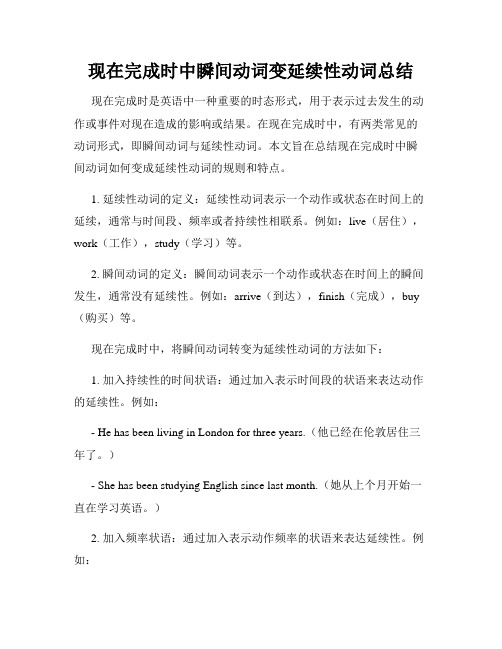
现在完成时中瞬间动词变延续性动词总结现在完成时是英语中一种重要的时态形式,用于表示过去发生的动作或事件对现在造成的影响或结果。
在现在完成时中,有两类常见的动词形式,即瞬间动词与延续性动词。
本文旨在总结现在完成时中瞬间动词如何变成延续性动词的规则和特点。
1. 延续性动词的定义:延续性动词表示一个动作或状态在时间上的延续,通常与时间段、频率或者持续性相联系。
例如:live(居住),work(工作),study(学习)等。
2. 瞬间动词的定义:瞬间动词表示一个动作或状态在时间上的瞬间发生,通常没有延续性。
例如:arrive(到达),finish(完成),buy (购买)等。
现在完成时中,将瞬间动词转变为延续性动词的方法如下:1. 加入持续性的时间状语:通过加入表示时间段的状语来表达动作的延续性。
例如:- He has been living in London for three years.(他已经在伦敦居住三年了。
)- She has been studying English since last month.(她从上个月开始一直在学习英语。
)2. 加入频率状语:通过加入表示动作频率的状语来表达延续性。
例如:- They have been playing tennis every weekend.(他们每个周末都在打网球。
)- I have been working out at the gym twice a week.(我每周在健身房锻炼两次。
)3. 加入表示动作状态的状语:通过加入表示动作状态的状语来表达延续性。
例如:- The team has been practicing hard for the upcoming tournament.(这个团队一直在为即将到来的比赛进行努力训练。
)- She has been studying diligently for her exams.(她为了考试一直努力学习。
现在完成时中瞬间动词变延续性动词总结

现在完成时中瞬间动词变延续性动词总结在现代汉语中,现在完成时是表示过去发生的动作对现在产生的影响的一种时态。
而在现在完成时中,瞬间动词和延续性动词的用法有所不同。
本文将从理论和实践两个方面,对现在完成时中瞬间动词变延续性动词进行总结。
一、现在完成时的构成现在完成时由“助动词have/has + 过去分词”构成。
例如:I have seen that movie.(我已经看过那部电影了。
)二、瞬间动词变延续性动词1. 瞬间动词变成延续性动词的方法在现在完成时中,瞬间动词变为延续性动词的方法主要是通过加上“-ing”后缀。
例如:come -> coming;go -> going;see -> seeing等。
这种变化使得原本表示瞬间动作的动词变成了表示持续性动作的动词。
2. 延续性动词的使用场合延续性动词表示的动作在时间上没有明确的结束点,通常是持续性的。
在现在完成时中,延续性动词的使用场合主要包括以下几种:(1)表示一个长时间内一直在进行的动作。
例如:I have been studying English for 5 years.(我已经学习英语5年了。
)(2)表示一个习惯性的动作或者状态。
例如:She has been playing the piano since she was a child.(她从小就一直在弹钢琴。
)(3)表示一个与现在有关联的动作或状态。
例如:He has been living in this city for 3 years.(他已经在这个城市生活了3年了。
)三、结论现在完成时中瞬间动词变延续性动词是一种常见的语法现象。
通过掌握这种现象,我们可以更好地理解和使用现在完成时这一时态。
这也有助于我们提高自己的语言表达能力,使我们的语言更加地规范和准确。
现在完成时中瞬间动词变延续性动词总结
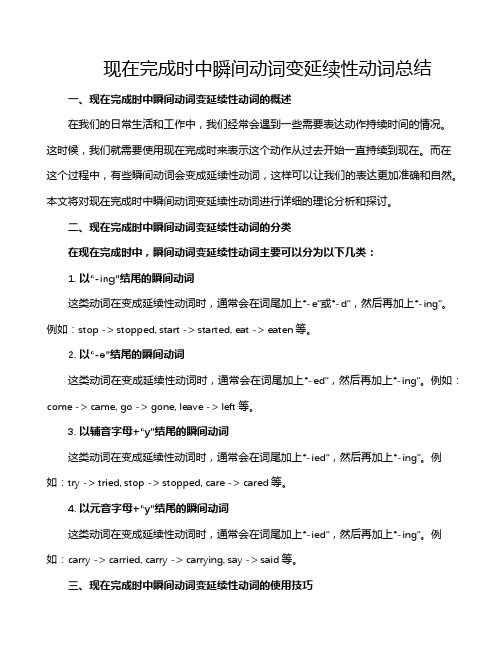
现在完成时中瞬间动词变延续性动词总结一、现在完成时中瞬间动词变延续性动词的概述在我们的日常生活和工作中,我们经常会遇到一些需要表达动作持续时间的情况。
这时候,我们就需要使用现在完成时来表示这个动作从过去开始一直持续到现在。
而在这个过程中,有些瞬间动词会变成延续性动词,这样可以让我们的表达更加准确和自然。
本文将对现在完成时中瞬间动词变延续性动词进行详细的理论分析和探讨。
二、现在完成时中瞬间动词变延续性动词的分类在现在完成时中,瞬间动词变延续性动词主要可以分为以下几类:1. 以“-ing”结尾的瞬间动词这类动词在变成延续性动词时,通常会在词尾加上“-e”或“-d”,然后再加上“-ing”。
例如:stop -> stopped, start -> started, eat -> eaten等。
2. 以“-e”结尾的瞬间动词这类动词在变成延续性动词时,通常会在词尾加上“-ed”,然后再加上“-ing”。
例如:come -> came, go -> gone, leave -> left等。
3. 以辅音字母+“y”结尾的瞬间动词这类动词在变成延续性动词时,通常会在词尾加上“-ied”,然后再加上“-ing”。
例如:try -> tried, stop -> stopped, care -> cared等。
4. 以元音字母+“y”结尾的瞬间动词这类动词在变成延续性动词时,通常会在词尾加上“-ied”,然后再加上“-ing”。
例如:carry -> carried, carry -> carrying, say -> said等。
三、现在完成时中瞬间动词变延续性动词的使用技巧虽然现在完成时中瞬间动词变延续性动词有很多种类,但是我们在实际使用过程中还是需要注意一些技巧:1. 要注意区分瞬间动词和延续性动词的用法。
有时候,两个词看起来很相似,但实际上它们的用法是不同的。
现在完成时中短暂性动词变延续性动词归纳表版
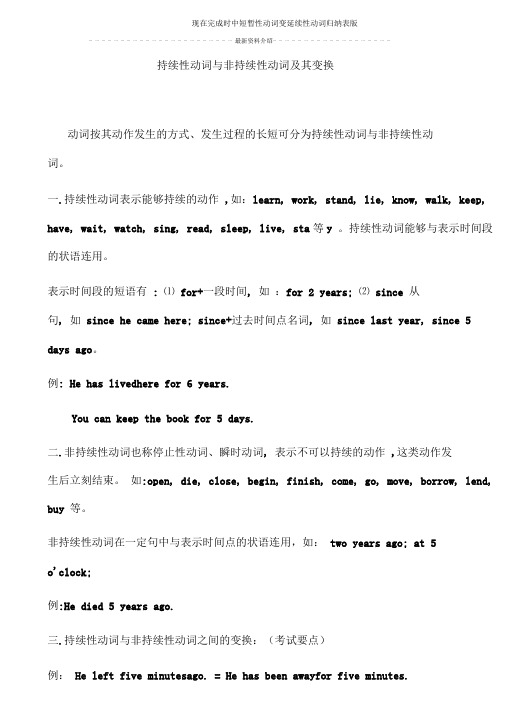
持续性动词与非持续性动词及其变换动词按其动作发生的方式、发生过程的长短可分为持续性动词与非持续性动词。
一.持续性动词表示能够持续的动作,如:learn, work, stand, lie, know, walk, keep, have, wait, watch, sing, read, sleep, live, sta等y 。
持续性动词能够与表示时间段的状语连用。
表示时间段的短语有: ⑴for+一段时间, 如:for 2 years; ⑵since 从句, 如since he came here; since+过去时间点名词, 如since last year, since 5 days ago。
例: He has livedhere for 6 years.You can keep the book for 5 days.二.非持续性动词也称停止性动词、瞬时动词, 表示不可以持续的动作,这类动作发生后立刻结束。
如:open, die, close, begin, finish, come, go, move, borrow, lend, buy 等。
非持续性动词在一定句中与表示时间点的状语连用,如:two years ago; at 5o'clock;例:He died 5 years ago.三.持续性动词与非持续性动词之间的变换:(考试要点)例:He left five minutesago. = He has been awayfor five minutes.这句话的意思是指他走开的动作是 5 分钟以前发生的,是过去时。
也就是说从他走开到此刻已经有五分钟了,这个动作是持续的,要用此刻达成时,并且要把本来的短暂性动词改为持续性动词。
一些短暂性动词及相应的持续性动词:arrive(get to /reach)→be here (in)begin(start)→be ondie →be deadcome here(back)→be here(back)leave →be away (from)fall ill(sick, asleep) →be ill(sick, asleep)get up →be upgo/ get ou(t there)→be out(there)finish →be overput on →wear 或be onopen →be open(keep sth. open)join →be in或be a member of +⋯组织机构close →be closedgo to school→be a studentborrow →keepbuy/get →havecatch(a cold)→have(a cold)get to know k→nowbegin to study→studycome to work→workmove to →live infinish →be overcome to →be insit down →be seatedmarry →be marrieddress →be dressedbecome→be3。
短暂性动词与延续性动词详解-转换表及练习
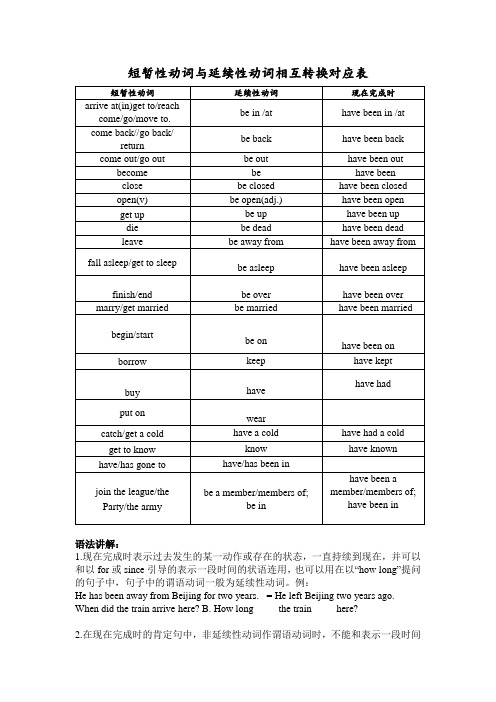
短暂性动词与延续性动词相互转换对应表语法讲解:1.现在完成时表示过去发生的某一动作或存在的状态,一直持续到现在,并可以和以 for或since引导的表示一段时间的状语连用,也可以用在以“how lon g”提问的句子中,句子中的谓语动词一般为延续性动词。
例:He has been away from Beijing for two years. = He left Beijing two years ago. When did the train arrive here? B. How long ____ the train ____ here?2.在现在完成时的肯定句中,非延续性动词作谓语动词时,不能和表示一段时间的状语连用。
但可以用其他句式来表示同一个意思。
例:Lucy has come back.The old man died 4 years ago. = The old man has been dead for 4 years.He has been away from Beijing for two years.= He left Beijing two years ago.= It is two years since he left Beijing.= Two years has passed since he left Beijing.3.非延续性动词可以在现在完成时的否定句中作谓语,并可以与for,since引导的时间状语连用,表示动作的延续过程。
例如:She hasn’t bought any new clothes since last year.I haven’t borrowed the book for a long time.巩固习题:1. When he arrived at the bus stop, the bus ________ for 20 minutes.A. has leftB. had leftC. has been awayD. had been away2. I ______ the League for 5 years so far.A. joinedB. have joinedC. have been in3. The factory ________ since the February of 1988.A . has been open B. has opened C. was open D. opened4. Mary and Rose _______friends since they met in 2000.A. have madeB. have beenC. madeD. have become5.The meeting _______ for a week now.A. has finishedB. has endedC. has been over6.Miss Gao ______ this school for nearly 5 years.A. has been inB. has come toC. has taught7.Ben ______ a teacher for 4 years .A. has beenB. has becomeC. wasD. became8. I ______ home for a week.A. have returnedB. have been backC. returned9. How long _______ he ________ ?A. diedB. has, diedC. has, been dead10. ----- How long can I ______ the book? ------ Two weeks.A. borrowB. lendC. getD. keep11.He ________ the car for a week.A. boughtB. has boughtC. has had12.-----How long _____ you _____ ill ? -----Two weeks.A. did fallB. have, fellC. have, been13.Since 2000, he _____ his hometown.A. has leftB. has moved awayC. has been away from14.I'll lend you the book , but you can only _____ it for 2 days.A. borrowB. keepC. take15.The bus ______ on the road for 2 hours so far.A. has stoppedB. stoppedC. has been16. Tom is ill in hospital. He _______ a cold for several days.A. isB. catchesC. has caughtD. has had17.He ________ for 2 hours.A. got upB. has got upC. has been up。
现在完成时中瞬间动词变延续性动词总结
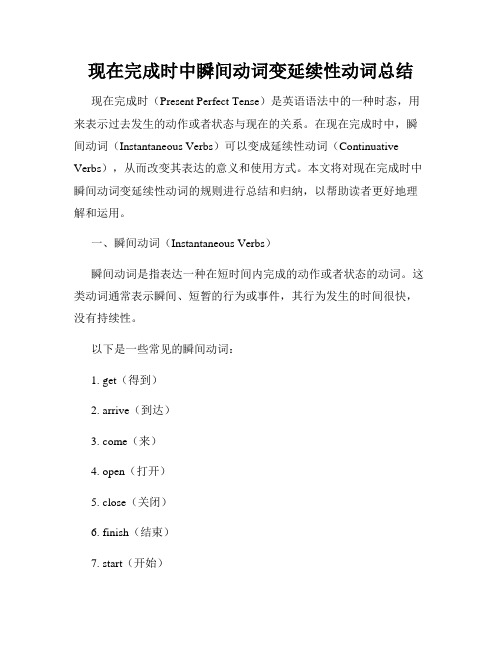
现在完成时中瞬间动词变延续性动词总结现在完成时(Present Perfect Tense)是英语语法中的一种时态,用来表示过去发生的动作或者状态与现在的关系。
在现在完成时中,瞬间动词(Instantaneous Verbs)可以变成延续性动词(Continuative Verbs),从而改变其表达的意义和使用方式。
本文将对现在完成时中瞬间动词变延续性动词的规则进行总结和归纳,以帮助读者更好地理解和运用。
一、瞬间动词(Instantaneous Verbs)瞬间动词是指表达一种在短时间内完成的动作或者状态的动词。
这类动词通常表示瞬间、短暂的行为或事件,其行为发生的时间很快,没有持续性。
以下是一些常见的瞬间动词:1. get(得到)2. arrive(到达)3. come(来)4. open(打开)5. close(关闭)6. finish(结束)7. start(开始)8. buy(购买)9. sell(出售)10. win(赢得)等等。
二、瞬间动词变延续性动词的规则现在完成时中,瞬间动词可以通过一些规则变成延续性动词,从而具有持续性。
一般而言,瞬间动词变延续性动词的方式有两种:添加辅助动词"have been"或使用"for"或"sice"引导的时间状语从句。
1. 添加辅助动词"have been"瞬间动词可以通过在其前面添加"have been"来表示一个动作或状态的持续性。
这种形式常常用于描述一个从过去某个时间开始一直延续到现在的动作或状态。
例如:- I have been living in this city for three years.(我在这个城市生活已经三年了。
)- He has been working on this project all day.(他从早到晚一直在做这个项目。
现在完成时态的动词转换
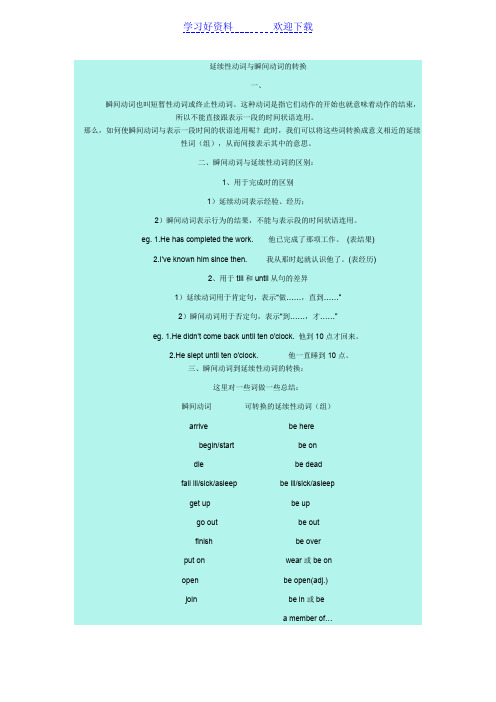
延续性动词与瞬间动词的转换一、瞬间动词也叫短暂性动词或终止性动词。
这种动词是指它们动作的开始也就意味着动作的结束,所以不能直接跟表示一段的时间状语连用。
那么,如何使瞬间动词与表示一段时间的状语连用呢?此时,我们可以将这些词转换成意义相近的延续性词(组),从而间接表示其中的意思。
二、瞬间动词与延续性动词的区别:1、用于完成时的区别1)延续动词表示经验、经历;2)瞬间动词表示行为的结果,不能与表示段的时间状语连用。
eg. 1.He has completed the work.他已完成了那项工作。
(表结果)2.I've known him since then.我从那时起就认识他了。
(表经历)2、用于till和until从句的差异1)延续动词用于肯定句,表示“做……,直到……”2)瞬间动词用于否定句,表示“到……,才……”eg. 1.He didn't come back until ten o'clock. 他到10点才回来。
2.He slept until ten o'clock.他一直睡到10点。
三、瞬间动词到延续性动词的转换:这里对一些词做一些总结:瞬间动词可转换的延续性动词(组)arrive be herebegin/start be ondie be deadfall ill/sick/asleep be ill/sick/asleepget up be upgo out be outfinish be overput on wear或be onopen be open(adj.)join be in或bea member of…close be closedgo to school be a studentborrow keepbuy havecatch(a cold) have(a cold)get to know knowbegin to study studycome to work workget up be upleave be away from等如:1.He has been a soldier for three years. 他参军三年了。
现在完成时之瞬间动词转变为持续性动词

现在完成时之瞬间动词转变为持续性动词(1)专题讲解:在完成时中,一个瞬间性动词(一次性动作)不能与表示一段时间的状语(for, since, how long等)连用,此时须将该瞬间动词改为延续性动词或状态动词.Eg:buy ( bought ) --- have / has had 买borrow (borrowed) --- have / has kept 借die ( died ) --- have / has been dead 死leave ( left ) --- have / has been away ( from ) 离开begin ( began ) --- have / has been on 开始join ( joined) --- have / has been in 参加、--- have / has been a ( party) membergo (went) --- have / has been there / in 去come/arrive/reach/get to --- have / has been here / in 来/到达end (ended) ----- have/has been over 结束eg. The film began five minutes ago.------The film has been on for five minutes.------It has been five minutes since the film began.用“be+形容词”代终止性动词.1、be+married代marry2、be+ill代fall (get) ill3、be+dead代die4、be+asleep代fall (get) asleep5、be+awake代wake/wake up6、be+open代open7、be closed代close/shut用“be+副词”代终止性动词1“be+on”代start,begin*2“be+up”代get up3“be+back(to)”代return to,come back to,go back to4“be here (there)”代come(arrive,reach,get) here或go (arrive,reach,get) there等等用“be+介词短语”代终止性动词1.“be in/at +地点”代替go to /come to2.用be in the army 代替join the army3.“be in/at +地点”代替move to四、巩固练习:》将瞬间动词变成延续性动词表:1. have arrived at/in....... got to/reached...... come/gone/moved to...... →2. have come/gone back/returned →3. have come/gone out →4. have become →5. have closed / opened→6. have fallen ill→7. have died →8. have left...... →*9. have fallen asleep/got to sleep →10. have finished/ended/completed →11. have married →12. have begun →13. have borrowed/bought →14. have/has gone to →15. have joined/have taken part in the league/the Party/the army→当堂过手练习:1、Her grandfather ______ for two years.A. diedB. has diedC. has been deadD. has been died2、His father ______ the Party since 1978 .&A. joinedB. has joinedC. was inD. has been in3、—Do you know him well— Sure .We _________ friends since ten years ago .A. wereB. have beenC. have becomeD. have made4、—How long have you ____ here—About two months .A. beenB. goneC. comeD. arrived5、Hurry up! The play __________ for ten minutes .A. has begunB. had begunC. has been onD. began6、It _____ ten years since he left the army .·A. isB. hasC. willD. was7、My parents ______ Shandong for ten years .A. have been inB. have been toC. have gone toD. have been8、has Mr White been a member of Greener China since he to ChinaA. How soon, comesB. How often, gotC. How long, cameD. How far, arrived9、The factory ____ since the February of 1988.A . has been open B. has opened C. was open D. opened10、Mary and Rose ____friends since they met in 2000.A. have madeB. have beenC. madeD. have become11、The meeting _____ for a week now.:A. has finishedB. has endedC. has been over been over12、Miss Gao ______ this school for nearly 5 years.A. has been inB. has come toC. has taughtD. has gone to13、Ben ______ a teacher for 4 years .A. has beenB. has becomeC. wasD. became14、I ______ home for a week.A. have returnedB. have been backC. returned been back to15、Ever since then, Tom _______a fan of classical music.A. has been C. has become D. have been。
- 1、下载文档前请自行甄别文档内容的完整性,平台不提供额外的编辑、内容补充、找答案等附加服务。
- 2、"仅部分预览"的文档,不可在线预览部分如存在完整性等问题,可反馈申请退款(可完整预览的文档不适用该条件!)。
- 3、如文档侵犯您的权益,请联系客服反馈,我们会尽快为您处理(人工客服工作时间:9:00-18:30)。
精品课件
短暂性动词
也称做点动词、非延续性动词或瞬间动词。
表示动作不能延续,只是一瞬间就精结品课件束的 动作。
常见的短暂性动词
come, go, arrive, reach, see,
hear, close, open, leave,
begin, start, lose, buy, fall,
His brother has been in the army since two years ago.
精品课件
It’s two years since his brother joined the army .
Two years has passed since his brother joined the army .
His grandfather has been dead since five years ago.
精品课件
It’s five years since his grandfather died.
Five years has passed since his grandfather died.
His brother borrowed the book two weeks ago.
Two weeks has passed since his brother borrowed the book .
His brother joined the army two years ago.
精品课件
His brother joined the army two years ago.
His brother has been in the army for two years .
精品课件
We haven’t seen him since 1992.
She hasn’t left home all her life.
在以下句型中,短暂性动词要转换成延续性动词:
现在完成时态的肯定句中,有for或since引导的,或其他种类的表 示一段时间的时间状语
例如:He has died for 20 years. 这句话就是错误的。
1. go there
be there
2. come here be here
3. come back be back
4. die 5. leave 6. open 7. close 8. go/get out
ቤተ መጻሕፍቲ ባይዱ
be dead be away (fr精品o课件m) be open be closed be out
die是一个瞬间动词,需要转化为延续性动词。
句子改为 He has been dead for 20 years.
精品课件
非延续性动词要转换成延续性动词,方法主要有 以下三种:
1. 实义动词转化成实义动词
1. borrow
keep
2. buy 3. put on
have wear
精品课件
2. 转化成be+形容词或介词
精品课件
His brother borrowed the book two weeks ago.
His brother has kept the book for two weeks .
His brother has kept the book since two weeks ago.
精品课件
It’s two weeks since his brother borrowed the book .
9. finish/end be over
10. become
be
11. get up
be up
12. begin/start(上 演)
be on
精品课件
3. 转化成be+名词(词组)
20. join the Party
be in the Party
精品课件
be a Party member
be a member of the Party
21. join the army be in the army be a soldier
精品课件
句型转换:
His grandfather died five years ago.
精品课件
句型转换:
His grandfather died five years ago.
His grandfather has been dead for five years .
join, die, become, borrow, get
up 等.
精品课件
1.它们可以用于完成时态,说明某个动作 的结 果还存在
e.g.
He has come back.
The film has begu精n品.课件
2.在否定句中,非延续性动词也可以用表示一段 时间的状语来修饰
e.g. I haven’t heard from Uncle Wang for a long time.
相关练习
8B unit2 课课练 grammar部分有相关练习 可自行完成,核对答案
精品课件
